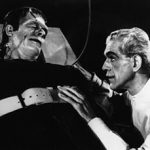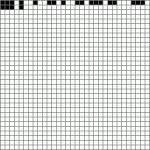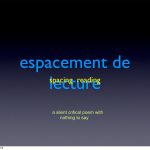2014
In “…without shame or concern for etymology,” Hanjo Berressem discusses Pynchon's Bleeding Edge in the context of post-9/11 fiction. In contrast to narratives of post-traumatic melancholy, Berressem argues that Bleeding Edge is a “Jeremiad about the fall and the sins of America.” The result is an essay that makes a powerful case for Pynchon as a prophetic, if brutal, witness to American society turning towards security and control in the shadow of tragedy.
In PAIN.TXT, Alan Sondheim and Sandy Baldwin explore the limitations of expression at the borders of human sensation. Derived from a dialog between Sondheim and Baldwin on extreme pain, this essay considers how one signifies intensity and another attempts to interpret that intensity, and the challenges this process poses for affect, imagination, and ultimately intersubjectivity. In keeping with the content of this piece, the two preserve the dialog format, recreating for readers a discourse on p...
In this ambitious piece, which was initially presented at the 2013 Paris meeting of the Electronic Literature Organization, John Barber examines the role of sound in born digital literary works. Identifying, initially, the rich history of sound art and radio drama, Barber goes on to probe the untapped potential of digital audio as a field for future development. Anticipating John Cayley's 2018 essays on Aurature in electronic literature, Barber in this essay sees sound moving into the foreground of a transformed literary experience, rather than just augmenting text based literary acts.
In this essay, Janez Strehovec explores the literary from the “nomadic cockpit” everyday life in the 21st Century. More than merely being cocooned by screens, Strehovec’s metaphor describes the way in which our travel through the environment is layered with navigational data, environmental surveillance, communication systems, and tied into a dynamic feedback loop. From this vantage point, Strehovec considers a number of works of digital art and electronic literature that are written precisely to be read in motion, to explore the sensations of life in the nomadic cockpit.
In “One + One = Zero,” Marjorie C. Luesebrink discusses “fleeting” messages and their implications for electronic literature. Beginning with a discussion of the popular social media app, Snapchat, Luesebrink considers a series of works of electronic literature that employ tropes of vanishing and inaccessibility to represent forgetfulness, limited perception, and the challenges posed by dynamic environments for contemporary readers. After tracing a path through two decades of digital practice, Luesebrink points to a future in which the vanishing text will continue to be a relevant site for literary innovation.
Commenting on the high price of long term literary collaboration (and the brevity of most funding in the Humanities), Samantha Gorman asks if it's necessary for arts practitioners today to create commercial start-ups. Can scholars and Digital Language Arts entrepreneurs find a way to bring literary work into "hybrid communities" and "outreach"?
How does the electronic literature community continue to develop? Amaranth Borsuk looks towards the print literature community, and suggests that we adopt a number of its most successful practices.
One of several early career participants at the Electronic Literature Organization's Summer 2012 "Futures" panel, Claire Donato comes down on the side of non-commercial, non-entrepreneurial, educational approaches to an emerging digital literary practice.
For Patrick LeMieux, the future of electronic literature is not before us, and instead entails an investigation of the past--of the unknowable territories we collaborate with through e-lit.
What are we to make of current calls for "practice based" research in the Digital Humanities and e-lit fields? What about "art as research"? Stephanie Boluk sounds a caution concerning the ways that literary studies are being worked into the "instrumentalization and corporatization of the university system."
In his video-poem "Reading the Wind," Dave (Jhave) Johnston identifies the current environment for electronic literature, and in doing so, claims the impossibility of knowing its future.
The practice of Electronic Literature has long raised questions about literary form, literary content, the author, the reader, the moment of publication, and the artifact itself. The companion to the lifecycle of the work in its ecosystem, of course, is the editorial vision itself. In this essay, Sandy Baldwin and Tiffany Zerby call for editors and publishers of works on and about e-lit to become active participants in the process of creating the entire work and in creating the field around wo...
Giorgio Agamben has identified the “State of Exception” as the emergent principle of governance for the 21st Century. Parallel to this crisis in politics, there is the increasing currency of the term emergence in literary criticism, media theory, and cultural studies to describe the general state of change. In this paper, Heckman considers electronic literature in the "state of emergency," as both a laboratory for formal innovation and a site of critique. Specifically, this paper takes into account the relationship between literacy, law, literature and criticism through a reading of Sandy Baldwin’s New Word Order, a work that reimagines poetry in the context of the first-person shooter game.
2013
Chris Funkhouser and Andrew Klobucar situate the poetry anthologized in the recent collection "Gnoetry Daily, Vol. 1: a collection of poetry written interactively with computers" within a long genealogy of computer aided writing in order to illustrate how that genealogy continues to be both aesthetically generative and socially significant.
Shoba Ghosh contends that in The Book of Portraiture, Steve Tomasula’s exploration of how artists in specific historic moments narrativize uncertainty in the constitution of the subject illuminates the conceptual framework that produces a number of significant global dynamics. According to Ghosh, Tomasula demonstrates that the contemporary subject’s body has become “no more than an agglomeration of brands” that can be “fashioned in the image of desire,” though at the same time, “desire also seeks to deterritorialize itself.” For Ghosh, Tomasula’s aesthetic treatment of that subject-defining tension ultimately assists in “track[ing] the loop by which Empire and Terrorism, State and Extremism, America and its 'other' produce each other simultaneously.”
According to Janez Strehovec, e-literature operates on the model of post-Fordist immaterial production. He argues it's precisely because "a part of contemporary art (especially the new media one and e-literature) is crossing into the service sector of (new) networked economy in the post-industrial, information, spectacle- and software society" that e-literature needs to cultivate its own autonomous context.
John Bruni contends that Cary Wolfe’s latest book "Before the Law: Humans and Other Animals in a Biopolitical Frame” discusses the “legal issues that inform our relationships with non-human animals.” Bruni writes that in doing so Wolfe dissects the process of law-making and appearing “before the law” as animals, which might be potentially harmful and eclipse the existence of animals beyond the human sphere. According to Bruni what distinguishes Wolfe’s perspective is that he does not promote any form of “ecological self-righteousness” but rather asks the question whether we need to move beyond species-based discourses that constantly pits humans and animals against each other in an essentially unwinnable impasse—to a more ethical approach that may expand the "community of living."
In his review of Christian Moraru’s recent Cosmodernism: American Narrative, Late Globalization, and the New Cultural Imaginary, Aron Pease considers the merits of the periodization advanced in that work. Ultimately, Pease argues that while the emphasis Moraru places on cosmodernism literature’s “relationality” means that the it is able to “register ‘the other’ as a concrete and organizing presence rather than as an abstract theme”, Moraru’s reliance on the nebulous term “globalization” fails to account for the extent to which the literature characterized as cosmodern reflects the political economy of late capitalism.
This introduction is not a "digital" essay, but what follows it - a version of a moving essay-poem originally presented in real time at the 2012 elo conference - is. Florence's presentation explores how the "espacement" (Mallarme, Derrida) intrinsic to all writing changes in a born-digital context. The work reminds us of something we anticipated early in the formation of ebr - that 'critifiction' is and always has been the way to make essays in the digital era.
"At the Time of Writing" considers the role of proprioception and the embodied memory of writing and gesture as a critical component of readerly practices. Anna Gibbs and Maria Angel examine a series of works of born digital literature that use representational techniques to evoke an "ethos of touch" that is critical to the experience of the work. Gibbs and Angel conclude that feeling is key to the process of meaning-making, and that experimental interfaces foreground the importance of the body in literature.



